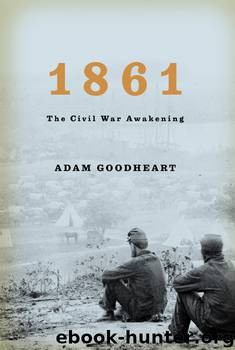1861 by Adam Goodheart

Author:Adam Goodheart [Goodheart, Adam]
Language: eng
Format: epub
ISBN: 978-0-307-59666-6
Publisher: Knopf Doubleday Publishing Group
Published: 2011-04-04T16:00:00+00:00
Afterward, in a letter to a close friend (a black New Yorker named Randolph Ryer), King exulted like a warrior returning from the field of victory. “I pitched into Secession, Concession, and Calhoun, right and left,” he wrote, “and made [even] Southerners applaud. I pledged California to a Northern Republic and to ‘a flag that should have no treacherous threads of cotton in its warp,’ and the audience came down with thunder.” When the oration was all over, Mrs. Frémont made her way to King through the pressing throng, and told him, he said, that “she would like to hear it forty nights in succession.… [I] am urged to give it all over the State, and help kill the Pacific-Republic folly. It was the occasion, thus far, of my existence.”76
He did not offer it for quite forty solid nights. But in the weeks ahead, King gave that speech again and again, to one packed house of Californians after another—not just in San Francisco, but in Marysville, Stockton, Sacramento. He spoke in gold-mining camps, and standing on saloon porches or tree stumps in towns with names like Deadwood, Rough and Ready, and Mad Mule—places where Southerners hissed him, or worse. He had never known the true exhilaration of public speaking, he told Mrs. Frémont, until he had to encounter a front row bristling with revolvers and bowie knives. Far better to face these, somehow, than the supercilious front pews of the Hollis Street church.77
When not traveling and speaking he was writing, usually in Mrs. Frémont’s garden. He composed a new oration on Daniel Webster—conveniently glossing over the Compromise of 1850, he admitted privately, but taking the occasion to remember the senator’s words when California achieved statehood: “At last we have seen our country stretch from sea to sea, and a new highway opened across the continent from us to our fellow-citizens on the shore of the Pacific. Far as they have gone, they are yet within the protection of the Union, and ready, I doubt it not, to join us all in its defence and support.” On April 19, he spoke on the anniversary of the Battle of Lexington—another opportunity to turn American history to the uses of the present.
Even the Eastern press was taking notice now. “The ghost of old Sam Adams abides with Mr. King,” wrote the New York Times’ West Coast correspondent. “While he charms his hearers with eloquence, he charges them with the very spirit that filled the air about Bunker Hill in 1774 and ’75…. He has brought every element of power that his popularity gives him to bear in all our cities in favor of liberty and human rights.”78
To be sure, the “Pacific-Republic folly” lingered, but now its would-be founding fathers were in full retreat. Asbury Harpending’s Alcatraz plot was foiled when one of his own coconspirators—a failed Senate candidate who had publicly called for Lincoln’s assassination—approached General Johnston to enlist him in the scheme. General Johnston may have been a Southerner, but he was a man of honor first.
Download
This site does not store any files on its server. We only index and link to content provided by other sites. Please contact the content providers to delete copyright contents if any and email us, we'll remove relevant links or contents immediately.
| Afghan & Iraq Wars | American Civil War |
| American Revolution | Vietnam War |
| World War I | World War II |
Waking Up in Heaven: A True Story of Brokenness, Heaven, and Life Again by McVea Crystal & Tresniowski Alex(37811)
Empire of the Sikhs by Patwant Singh(23086)
We're Going to Need More Wine by Gabrielle Union(19046)
Hans Sturm: A Soldier's Odyssey on the Eastern Front by Gordon Williamson(18592)
Leonardo da Vinci by Walter Isaacson(13336)
The Radium Girls by Kate Moore(12028)
Tools of Titans by Timothy Ferriss(8396)
Educated by Tara Westover(8054)
How to Be a Bawse: A Guide to Conquering Life by Lilly Singh(7486)
Permanent Record by Edward Snowden(5847)
The Last Black Unicorn by Tiffany Haddish(5636)
The Rise and Fall of Senator Joe McCarthy by James Cross Giblin(5280)
Promise Me, Dad by Joe Biden(5153)
The Wind in My Hair by Masih Alinejad(5095)
A Higher Loyalty: Truth, Lies, and Leadership by James Comey(4964)
The Crown by Robert Lacey(4817)
The Iron Duke by The Iron Duke(4356)
Joan of Arc by Mary Gordon(4112)
Stalin by Stephen Kotkin(3966)
